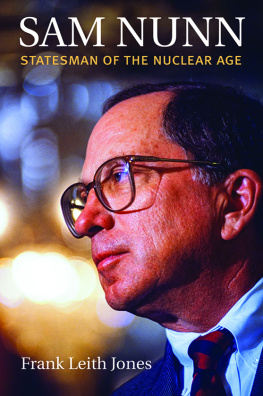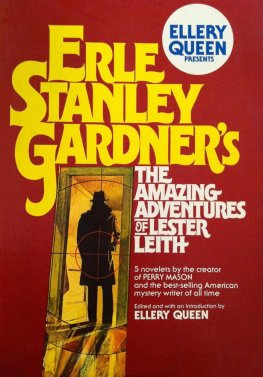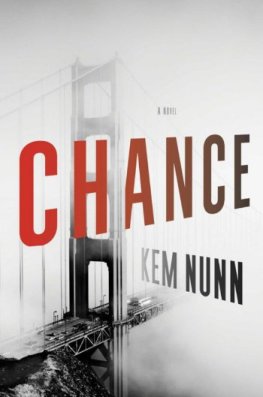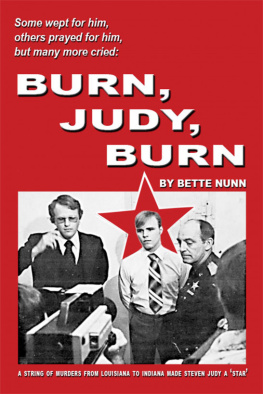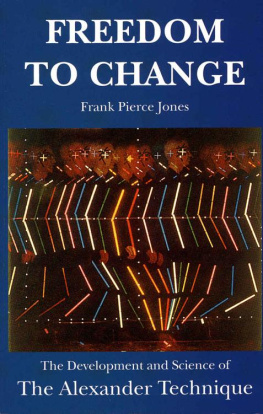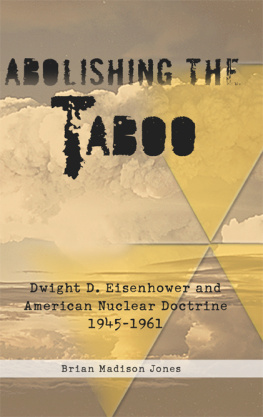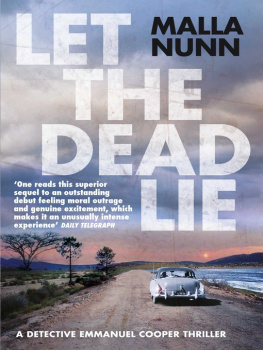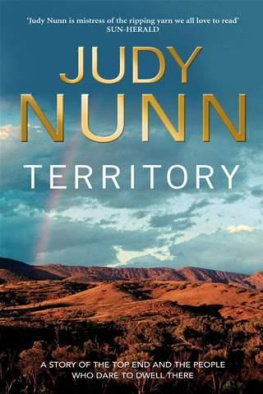2020 by the University Press of Kansas
All rights reserved
Published by the University Press of Kansas (Lawrence, Kansas 66045), which was organized by the Kansas Board of Regents and is operated and funded by Emporia State University, Fort Hays State University, Kansas State University, Pittsburg State University, the University of Kansas, and Wichita State University.
Publication made possible, in part, by funding
from The Dirksen Congressional Center.
Library of Congress Cataloging-in-Publication Data
Names: Jones, Frank L. (Frank Leith), author. Title: Sam Nunn : statesman of the nuclear age / Frank Leith Jones. Other titles: Statesman of the nuclear age
Description: [Lawrence] : University Press of Kansas, [2020] | Series: Congressional leaders | Includes bibliographical references and index.
Identifiers: LCCN 2020011790
ISBN 9780700630127 (cloth)
ISBN 9780700630134 (epub)
Subjects: LCSH: Nunn, Sam. | Nunn, SamInfluence. | United States. Congress. SenateBiography. | United States. Congress. Senate. Committee on Armed Services. | LegislatorsUnited StatesBiography. | United StatesPolitics and government19451989. | United StatesPolitics and government1989 | National securityUnited States. Classification: LCC E748.N86 J66 2020 | DDC 328.73/092 [B]dc23 LC record available at https://lccn.loc.gov/2020011790.
British Library Cataloguing-in-Publication Data is available.
Printed in the United States of America
10987654321
The paper used in the print publication is recycled and contains 30 percent postconsumer waste. It is acid free and meets the minimum requirements of the American National Standard for Permanence of Paper for Printed Library Materials Z39.48-1992.
SERIES FOREWORD
C ongressional leadership comes in many forms. The first book in this series, on Bob Michel, detailed how a man of the minority exerted influence in the House (and beyond) over the arc of a long career. A subsequent volume will flesh out Representative Tom Foleys long rise to leadership in the US House. Both Michel and Foley served as formal party leaders in Congress, which constitutes one clear form of leadership. But it is far from the only path to leadership within the Congress. Margaret Chase Smith (R-ME), for example, led as a strong woman legislator, ahead of her time and unflinching in her opposition to the malevolent tactics of Senator Joe McCarthy (R-WI). Or, through a forty-year career, Representative Henry Waxman (D-CA) demonstrated how a single policyoriented legislator could exercise great influence on the course of national environmental and energy policies, among other subjects.
Georgia Democratic senator Sam Nunn represents another style of broad policy leadership, one that, while based in the Senate, extended through the whole of American national government and beyond, to affect American and international interests around the world. Frank Jones concludes:
Senator Nunns legacy as a strategic leader resulted from his vision of what the United States should do to maintain the international order it preferred, by aligning policy and resources through legislation and other means to promote that vision, and by working within the Senate, but also with the House of Representatives, the executive branch, and internationally, to build consensus and thereby meet the challenges that the nation and its allies and partners confronted for more than two decades.
Very few contemporary US senators have achieved such a status as a strategic leader; a short list would include William Fulbright (D-AR), Henry Scoop Jackson (D-WA), and perhaps John McCain (R-AZ). Like Nunn, they all enjoyed a long tenure, high committee positions, and formidable expertise.
Nunns policy leadership flowed from various sources, all overlapping and complementing each other. First, he won election to the Senate in 1972 at age thirty-four and soon became a protg of the powerful John Stennis (D-MS). He moved up the seniority ladder, expanded his expertise, and chaired the Senate Armed Services Committee from 1987 to 1995. In short, his tenure led to the possibility of great influence when he became committee chair. Second, Nunn became a genuine policy expert on a wide range of defense issues, including arms control; moreover, he understood the defense budget from top to bottom. Beyond that, the Nunn enterprise included several top-flight staffers who could further his agenda.
Third, Nunns political stance as a moderate Democrat allowed him substantial latitude to make deals with senators from both parties. From conservative Republican Barry Goldwater to liberal Democrat Ted Kennedy, Senate leaders often knew that they could not take his vote for granted and that a Nunn defection would provide cover for other potential defectors. This meant that, even though he was just one of 100 senators, he could wield influence beyond his own vote or even his position as a committee chair.
Finally, the political context of his time as Armed Services Committee chair gave him substantial opportunities to work with Republican presidents Ronald Reagan and George H. W. Bush as the Cold War ended and new geopolitical lines were drawn. By the early 1990s, he knew all the players, both domestic and foreign, and could talk directly with them. To an extent his policy leadership transcended the Congress, extending to the White House, the Defense Department, and beyond. Moreover, when Nunn left the Senate in 1997, his influence continued for more than two decades, most notably on nuclear threat initiatives.
In sum, Sam Nunn led through his policy expertise and his political acumen as he built bridges to and forged alliances with a wide array of political allies and, more than occasionally, adversaries. Not all senators are leaders, but for some, like Nunn, the United States Senate provides great opportunities to lead, if you can grasp them. Without a doubt, he could and did.
Burdett A. Loomis
Series Editor
ACKNOWLEDGMENTS
T his book began with a conversation about the influence the chair of the Senate Armed Services Committee, as a congressional leader, has on US national security policy and strategy. My interlocutor was Jim Locher, who served as a committee staff member as well as an assistant secretary of defense in the George H. W. Bush administration. He is the author of an excellent book on the Goldwater-Nichols Act, which figures prominently in this book. Jim and I discussed a number of potential subjects, but I had only one in mindSenator Sam Nunn. Jim informed me that Senator Nunn was a private man and was uncertain if he would acquiesce to someone writing about his career, but he considerately introduced me to Cathy Gwin, who served as Senator Nunns press secretary at one time and is currently the senior director for communications at the Nuclear Threat Initiative (NTI). NTI is a nonprofit, nonpartisan organization that Senator Nunn and the philanthropist Ted Turner founded in 2001 to reduce the likelihood of attacks and accidents involving weapons of mass destruction. Cathy and I met to discuss my interest. She subsequently conveyed my proposal to Senator Nunn, and after a period of consideration, he called me and told me I had his complete support. He gave me access to his personal papers and the oral histories he conducted with his staff just before his retirement from the Senate in 1996, and offered any other help he could render. Without his approval and assistance, the book would not have been possible.


